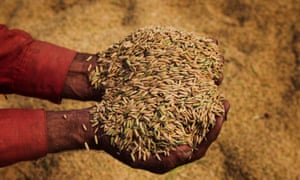Companies must produce enough to feed the world while respecting natural boundaries
Sunny Verghese, co-founder and group chief executive officer, Olam International
An increasing number of CEOs and boards are asking themselves a somewhat surprising question, one that at first glance might seem to sceptics to be almost “un-corporate”: if my business is not helping to create a better future for the planet and its people, what is the point of all this overwhelming effort?
“Purpose-driven leadership” can sound like a buzz phrase, or worse, the latest in management consulting-speak. It can be dismissed as the politically correct quote for annual reports, or as new-age soul searching by companies that have reaped profits by focusing only on value creation at any cost in the past.
Yet, increasingly, successful companies are those that truly adopt purpose-driven leadership. This helps them grow and prosper. It helps them attract and keep the best people. It ensures they find like-minded partners to help them tackle challenges. And it generates investment from shareholders with a long-term view. Companies can maximise purpose and value at the same time, with each supporting the other. It need not be an either/or choice, but can be both.
I am 57 years old, co-founded Olam, and have been its global CEO since inception. But it is only in the last 10 years that I have been forced to confront this issue head on. It started with having to answer simple questions from my own children: why do I do what I do? How does the company that I have spent my life building create a better future for people living in poverty and for the world? If it does not, then why bother?
Facing up to these tough questions crystalised my sensibility on why sustainability and growing responsibly must be at the core of Olam. It needs to live up to the meaning of its name, transcending boundaries and enduring.
The global agri-sector is at the nexus of some of the most intractable challenges the world faces – food, water, energy security, inclusive growth and sustainable growth. Do we want to contribute to the problem or become part of the solution? Sustainable growth without depleting the world’s natural capital – its global commons – is critical to tackling climate change. And delivering inclusive growth through livelihoods and engaging with communities is essential to reducing poverty and hunger.
For those seeking purpose in what they do, the agriculture sector offers a range of options.
It generates employment for 40% of the world’s population, often the poorest in society. It is therefore crucial to creating viable livelihoods for them. Many are smallholders who can be helped to organise themselves into cooperatives. Once in a collective structure, they increase their access to funding, their produce is easier to aggregate and sell, and they are more likely to benefit from collective training to increase the yield and quality of their crops.
Sustainable supply chains improve the lives of millions of smallholders through creating a more entrepreneurial mindset, generating higher price premiums for certified or high quality produce and opening access to technology-driven innovation. Ultimately they put power in the hands of the farmers themselves to drive their own businesses. As we do so, the economic competitiveness of countries and their environmental track records can be enhanced.
Despite great leaps forward in agricultural practices, we are still in a world where 3.1 million children die each year through malnutrition and 795 million people go to bed each night hungry. This in the same world where 35% of all the food we produce is wasted. Surely there are few greater purposes for the agriculture sector than partnering to improve how we produce and deliver food sustainably to reduce preventable hunger and death.
The agri-industry is a huge draw on natural capital – water in particular – and on land use change. Yet to feed a world population expected to reach 9.7 billion, the amount of crops we grow is going to have to double. This is one of the “grand challenges” that we face and one to which no one as yet has the answer. Mobilising technology and scientific breakthroughs to increase yields will make a contribution, but will still leave a productivity gap.

